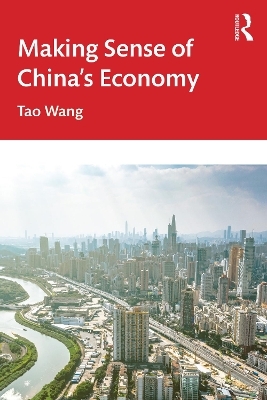
Making Sense of China's Economy
Seiten
2023
Taylor & Francis Ltd (Verlag)
978-1-032-31706-9 (ISBN)
Taylor & Francis Ltd (Verlag)
978-1-032-31706-9 (ISBN)
- Noch nicht erschienen
- Versandkostenfrei
- Auch auf Rechnung
- Artikel merken
This book reveals how factors such as demographics, the initial stage of development in 1978, the transition away from full state ownership and central planning, the dual urban-rural society, and a decentralised governance structure have combined to shape China’s economy, its development and its reforms.
For years, China’s transformation from one of the world’s poorest nations was lauded as a triumph that lifted hundreds of millions of people out of poverty. There were always questions about data reliability and growth sustainability, but the general views on China have recently taken a decidedly sour turn. Concerns abound about state interference in the economy, an ageing population, and high debt level. Making Sense of China's Economy untangles China’s complex economic structure, evolving issues and curious contradictions, and explains some key features of this most puzzling of global economic powerhouses.
This book reveals how factors such as demographics, the initial stage of development in 1978, the transition away from full state ownership and central planning, the dual urban-rural society, and a decentralised governance structure have combined to shape the economy, its development and its reforms. It shows how the pragmatic and adaptive nature of China’s policymaking upends familiar perspectives and hinders simple cross-country comparisons. The book also explores crucial topics including the property market, debt accumulation and environmental challenges.
In this book, Tao Wang innovatively weaves the multiple strands of China’s economy into a holistic and organic tapestry that gives us unique insights from both a Chinese and an international perspective.
This book is critical reading for business leaders, investors, policymakers, students, and anyone else hoping to understand China’s economy and its future evolution and impact, written by a specialist who has studied the country from both inside and out.
For years, China’s transformation from one of the world’s poorest nations was lauded as a triumph that lifted hundreds of millions of people out of poverty. There were always questions about data reliability and growth sustainability, but the general views on China have recently taken a decidedly sour turn. Concerns abound about state interference in the economy, an ageing population, and high debt level. Making Sense of China's Economy untangles China’s complex economic structure, evolving issues and curious contradictions, and explains some key features of this most puzzling of global economic powerhouses.
This book reveals how factors such as demographics, the initial stage of development in 1978, the transition away from full state ownership and central planning, the dual urban-rural society, and a decentralised governance structure have combined to shape the economy, its development and its reforms. It shows how the pragmatic and adaptive nature of China’s policymaking upends familiar perspectives and hinders simple cross-country comparisons. The book also explores crucial topics including the property market, debt accumulation and environmental challenges.
In this book, Tao Wang innovatively weaves the multiple strands of China’s economy into a holistic and organic tapestry that gives us unique insights from both a Chinese and an international perspective.
This book is critical reading for business leaders, investors, policymakers, students, and anyone else hoping to understand China’s economy and its future evolution and impact, written by a specialist who has studied the country from both inside and out.
Tao Wang, Ph.D., is Chief China Economist at UBS Investment Bank in Hong Kong and formerly an economist at the IMF.
Introduction 1. China’s economy — the ever-changing puzzle 2. The evolving economic structure 3. The road to here – key reforms since 1978 4. The state versus the market 5. How does economic policy work in China? 6. Urbanisation and the urban-rural divide 7. Property market and local-government finance 8. The slow move towards a consumer economy 9. How serious is the debt problem? 10. The environment, public health, and the government management challenge 11. China and the world 12. Can China sustain its economic development? Appendix: Availability and reliability of China’s economic statistics
| Erscheint lt. Verlag | 20.4.2023 |
|---|---|
| Zusatzinfo | 69 Line drawings, black and white; 69 Illustrations, black and white |
| Verlagsort | London |
| Sprache | englisch |
| Maße | 156 x 234 mm |
| Themenwelt | Sozialwissenschaften ► Soziologie ► Spezielle Soziologien |
| Wirtschaft ► Volkswirtschaftslehre ► Wirtschaftspolitik | |
| ISBN-10 | 1-032-31706-X / 103231706X |
| ISBN-13 | 978-1-032-31706-9 / 9781032317069 |
| Zustand | Neuware |
| Haben Sie eine Frage zum Produkt? |
Mehr entdecken
aus dem Bereich
aus dem Bereich
eine Einführung
Buch | Softcover (2024)
De Gruyter Oldenbourg (Verlag)
CHF 41,90


